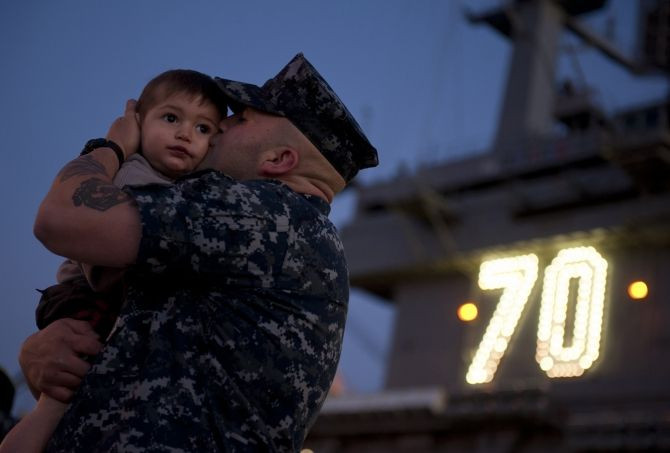Veterans Going Home: Who Struggles After War?

While most American troops are able to shift smoothly from military to civilian life, nearly a third struggle with the transition but the probability of experiencing a difficult return home can be predicted, the Pew Research Center reported Thursday.
The report states that 27 percent of all military veterans express difficulty transitioning from active duty. The proportion escalates to 44 percent for veterans serving since the September 11, 2011 terrorist attacks. That rate is higher than for those who served in Vietnam, Korea, or in World War II.
The report finds a significant disparity in distress between veterans serving since 9/11 and the overall veteran reports.
It was found that 32 percent of all veterans say that their experience in the military was “emotionally traumatic or distressing” compared to 43 percent of those who have served since 9/11.
Researchers found that there were several factors that can individually predict the chance and level of difficulty for veterans re-entering civilian life after analyzing the attitudes, experiences and demographic characteristic of the members in service.
Researchers found that veterans who had experienced emotional or physical trauma while serving are at the highest risk of having difficulties readjusting to civilian life, according to analysis the emotionally distressing experience reduces the chances a veteran can have a relatively easy re-entry by 26 percentage points compared with a veteran with no traumatic experience.
A veteran suffering a serious injury while serving reduces the probability of an easy re-entry by 19 percentage points.
Being married while serving reduces ease by 15 percentage points, the same reduction as serving since 9/11. That is followed by a 7 percent reduction for serving in combat and a 6 percent reduction if the veteran knew a person who was killed or injured.
Researchers were most surprised by the finding that post-9/11 vets who were married while in service had a harder time readjusting to civilian life than their single counterparts.
“At first glance, this finding seems counterintuitive,” the Pew report states. “Shouldn’t a spouse be a source of comfort and support for a discharged veteran? Other studies of the general population have shown that marriage is associated with a number of benefits, including better health and higher overall satisfaction with life.”
“In fact, the answer to another survey question points to a likely explanation. Post-9/11 veterans who were married while in the service were asked what impact deployments had on their relationship with their spouse. Nearly half (48 percent) say the impact was negative, and this group is significantly more likely than other veterans to have had family problems after they were discharged (77 percent vs. 34 percent) and to say they had a difficult re-entry,” the report explains.
The study also found several factors increased the chances for an easier reentry into civilian life: being a commissioned officer, having a college degree, and having a clear understanding of the mission. Religious faith was found to have the greatest positive impact, adding 24 percentage points to the likelihood of recovery.
Published by Medicaldaily.com



























